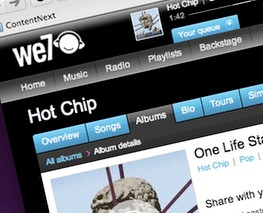
European music service We7 has finally completed the pivot with which it hopes to step out of the on-demand music shadow cast by Spotify and on to a more Pandora-like footing. A redesigned site on Thursday brings personalised radio serendipity out entirely in front of on-demand choice.
This was the repositioning We7 announced back in November 2010. The full change was delayed while it searched for new funding this year.
Though non-specific, Pandora-style “radio” is now the primary listening option, users can still “request” a specific track on-demand. But free users can make only 50 requests per month. Ad-free subscriptions, which We7 is retaining (£5 per month standard, £10 for mobile access), will give users unlimited requests.
The turnaround will save We7 money on royalties. PRS For Music’s interactive webcast rate is 0.065p per song versus the on-demand rate of 0.085p – a 23.5 percent saving. The 50-request limit essentially caps We7’s royalty outgoings as far as free on-demand listening goes.
“Radio plays are indeed cheaper than on-demand plays,” We7 CEO Steve Purdham tells paidContent. “However, our user base is leaning towards radio and the current site stats spell that out. If our users increase as we believe they will, we will still have the on-demand plays in place and so will still have to pay the relevant license on all of those.”
On its newly designers site, We7 is reserving top-banner and right-hand space for rich display ads. “The new ad format (halo) is a much bigger space for brands to engage with.,” Purdham says. “We believe that this format is far more eye catching for brands without being intrusive on the users experience.”
Spotify is one of several on-demand music services cropping up, and is the most successful and best-funded of the bunch compared to We7. Ceding the on-demand ground appears smart. We7 was already finding 70 percent of its consumption coming from its radio service in the UK, 30 percent from on-demand.
We7 wants to become a Pandora (NYSE: P) for Europe. But Pandora, with its influx of IPO cash, has set international as one of its own priorities. That could put We7 either on a collision course with Pandora, or perhaps in its shop window.
We can’t say when or indeed if Pandora will launch in Europe,” Purdham says. “All we know is that we believe that radio functionality is how we can create a unique market space for We7 in the increasingly crowded European market that is music streaming. If Pandora do launch they will also need to address the radio licensing issue which is more complex in Europe than the US. Our difference will be the request facility on the site and the size of our music catalogue.”
